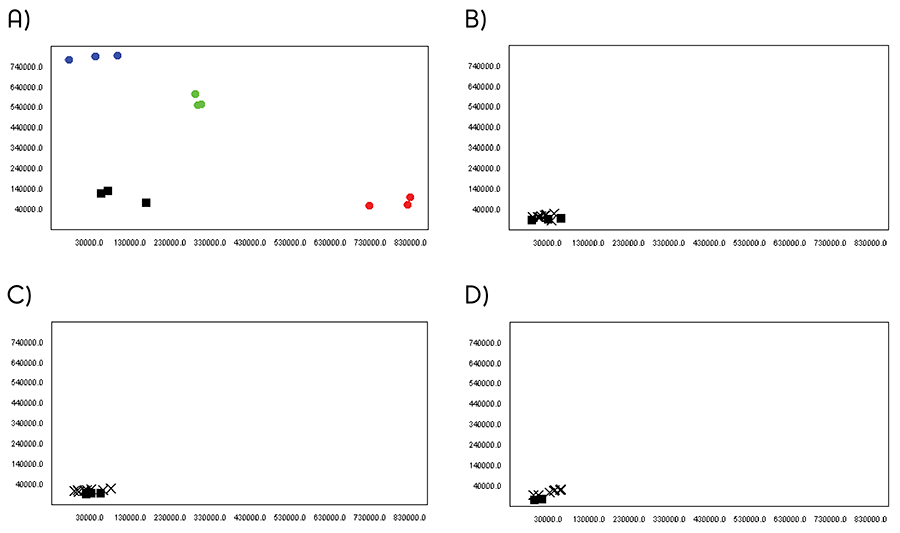Lyo-Ready Genotyping Direct qPCR Urine
Lyo-Ready Genotyping Direct qPCR Urine has been optimized to provide highly specific allelic discrimination as demonstrated by excellent cluster separation, even in the presence of PCR inhibitors found in crude human urine samples. Furthermore, it can be used in a liquid or lyophilized format to create ambient-temperature stable assays, making it ideal for point-of-care (POC) devices.
Have questions about a product?
Contact us to learn more about Meridian’s molecular or immunoassay reagent portfolio. We want to hear from you!
30% Pooled Human Urine and Bladder Cancer Associated Targets

Detection of bladder cancer-associated PAI1 mutation (SNP accession number: rs7242) , in presence of 30% pooled human urine with A/ Lyo-Ready Genotyping Direct qPCR Urine Mix, B/ Roche Kapa Probe Force, C/ ThermoFisher TaqPath™ and D/ Qiagen Type-it Fast SNP Probe PCR Kits. Homozygous samples for allele T (red) and allele G (blue) and heterozygous samples for allele T/G (green) were compared with a NTC (black) and x for undetermined. The results illustrate ability of Lyo-Ready Genotyping Direct qPCR Urine to form tight clustering and so accurate allelic discrimination in the presence of 30% crude urine unlike the other mixes.
Lyo-Ready Genotyping Direct qPCR Urine, 4x, MDX158
Inhibitor tolerance to 20% urine. Compatible with all dual-label probe chemistries for detection of genetic variants, such as single nucleotide and copy number variants, to give highly reproducible allelic discrimination.
Documents & Resources
SNPs (single nucleotide polymorphisms) or point mutations are the most common types of genetic variation and comprise the major part of phenotype diversity between individuals. SNPs can be responsible for both resistance or susceptibility to a certain disease and once individual SNPs have been identified by sequencing, they can be used for pharmacogenetics, in evaluating and predicting a patient’s response to treatment and risk of adverse events, or for diagnostics, such as in cancer screening. Clinical screening of SNPs requires large-scale multiplexed genotyping, which traditionally relies on DNA extraction from complex samples such as blood, to achieve sensitive DNA amplification. However, blood collection is invasive and requires a professional, urine on the other hand is an extremely non-invasive process, that is safe, less expensive and easy to do at home, making it ideal for large population or frequent sampling, particularly when children or people that will not comply with blood collections.
Meridian’s Lyo-Ready Genotyping Direct qPCR Urine is a 4x inhibitor-resistant mix designed for highly specific and sensitive amplification for genotyping sequence variants, even in the presence of PCR inhibitors found in crude urine samples, to give exceptional cluster resolution with clear allele discrimination, even with challenging SNP targets. Furthermore, it can be used in a liquid or lyophilized format to create ambient-temperature stable assays, making it ideal for point-of-care (POC) devices.
Catalogs & Brochures
Meridian Air Dryable Direct UrineAir-Dryable Direct Urine
Lyo-Ready Direct LAMP Urine MixesLyo-Ready Direct LAMP Urine Mixes
Lyo-Ready Genotyping Direct DNA qPCR UrineLyo-Ready Genotyping Direct DNA qPCR Urine
FAQs: Lyo-Ready Genotyping Direct qPCR FFPE
Allelic discrimination are methods to discriminate between two or more sequence changes at a particular gene locus. Typically, one allele (“wild type” DNA sequence) is common, and other alleles (mutation) is rare. In a SNP there are 3 genotypes: – a diploid homozygote (two wild type alleles (PP)), a diploid homozygote (two mutant alleles (pp)) and a heterozygote (one wild type allele and one mutant allele (Pp)).
SNPs (single nucleotide polymorphisms) help predict an individual’s resistance or susceptibility to certain drugs (pharmacogenetics), susceptibility to environmental factors such as toxins, and risk of developing diseases. SNPs can also be used to track the inheritance of disease-associated genetic variants within families.
qPCR (real-time PCR) enables you to screen known SNPs. The benefits of qPCR are that it is easy, accurate, and can scale to high throughput. The bioinformatic analysis is also less complex than for other technologies, such as sequencing and microarrays.
5′-nuclease (TaqMan) allelic discrimination uses a primer pair to amplify the target area and two allele-specific probes to detect your target SNP alleles and report the genotypes of your samples. Unlike normal qPCR, in genotyping the fluorescence level is only measured at the end of the PCR and the results are displayed on a scatter plot, allowing hundreds of assays to be run and analysed in parallel.
Urea, metabolites and electrolytes, beta-human chorionic gonadotropin, volatile organic compounds.
Yes, the Lyo-Ready Genotyping Direct qPCR Urine can be used as a liquid mix or lyophilized and stored at ambient temperature without needing to change the reaction conditions and lyophilization/storage will not affect the sensitivity of the test.
SNP biomarkers for the urogenital tract cancers such as, ovarian, colorectal, prostate, cervical & endometrial, renal and bladder cancer, and other cancers, such as thyroid, lung, liver, breast, gastric and pancreatic cancer.
Get In Touch With A Specialist
Have questions about a product? Want to learn more about Meridian’s molecular or immunoassay reagent portfolio? We want to hear from you!